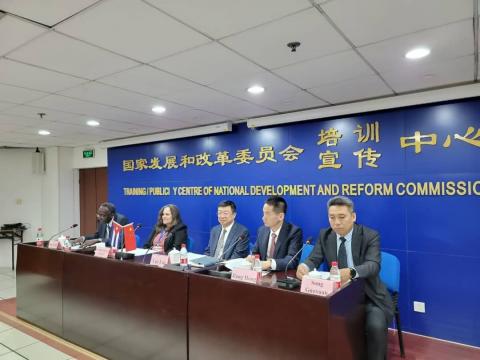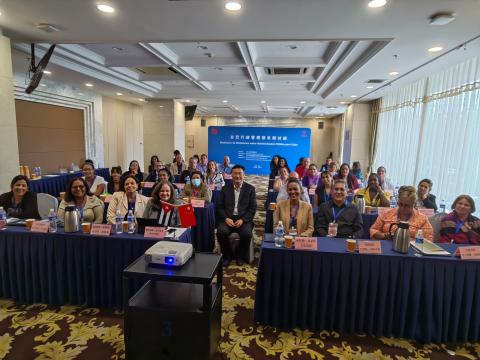Ministerial Seminar Public Administration for Cuba in the People's Republic of China


The Higher School of State and Government Staff (ESCEG) participates in the Public Administration Ministerial Seminar for Cuba, from October 17 to 30 in the People's Republic of China. This bilateral seminar was given by the International Cooperation Center of the National Development and Reform Commission of China and organized jointly with the Higher School of State and Government Cadres, under the auspices of the Ministry of Commerce of China (MOFCOM) and the Ministry of Foreign Trade and Foreign Investment of Cuba, together with the Embassies of the People's Republic of China and the Republic of Cuba.
The 35 participants in the Seminar belong to 21 bodies and agencies of the central administration of the state and 28 different institutions, respectively, of which 94% are managers, many of whom occupy main management positions in Cuba, as well as 29 % are linked to the process of preparing the paintings. The composition of the group facilitates the teaching-learning process and the assimilation of good practices for Cuba. Public Administration for Cuba.
The seminar included 25 activities, including class teaching, cases, visits and research, cultural, historical and customary experiences, symposium and exchanges with directors of the National Development and Reform Commission and experts from thinking tank institutions, whose learnings and good practices constitute references for their assimilation and implementation in Cuba. He also exchanged with the Ambassador of the Republic of Cuba in China.
The Seminar taught topics such as: Xi Jinping's thought on socialism with Chinese characteristics for a new era, governance, long-term planning, the meaning and characteristics of the 14 five-year plans in correspondence with the conditions, needs to be met. satisfy the people and goals to be achieved, the combination in the National Territorial Planning Plan of the special plan and the regional plan, the new pattern of high-quality development of China, its comprehensiveness, harmonious regional development in harmony between man, nature, technology and innovation, the circular economy, the digital economy, the use of renewable energy sources, the system of green policies and low carbon emissions, ecological and material civilization integrated with the spiritual. Among the good practice visits, those made to the Shanghai Logistics and Supply Chain Business Group, the Zhejiang Planning and Development Institute, the Beijing Energy Corporation and the Cuban China Biotech Company stand out.
The Rector of the ESCEG, Dr. C. Mercedes Delgado Fernández, expressed in the closing speech the meaning of the course, according to the criteria issued by the students, who when expressing its meaning value it as: excellent, extraordinary, useful, empowering, guiding, instructive, inspiring, admiration, respect, cooperation, hospitality, openness, comprehensiveness, learning, culture, history, innovation, hope and commitment to the future.
